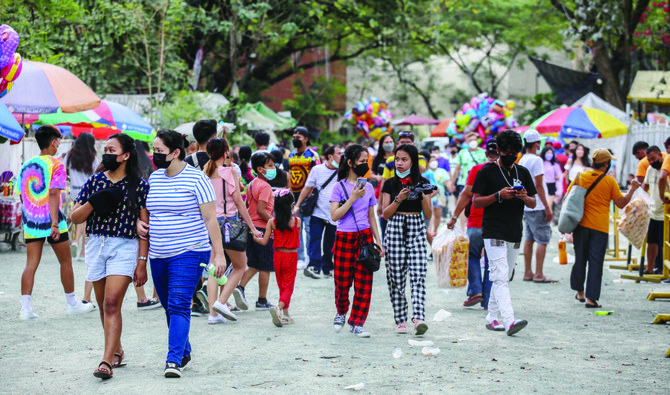MANILA: Philippine officials warned incoming travelers against violating COVID-19 quarantine protocols on Monday, as the country gears up to face the highly transmissible omicron variant amid a sharp rise in COVID-19 cases.
The warning comes after a Filipino traveler returning from the US allegedly breached quarantine rules to attend a party in Makati City — part of the Metro Manila region and the country’s financial hub — in December, later testing positive for COVID-19 along with seven of her 15 close contacts. Authorities have since launched an investigation into the case.
In a televised interview, presidential spokesperson Karlos Nograles said that violators will be subject to fines of up to 50,000 Philippine pesos ($1,000) or up to six months’ imprisonment.
“If you’re thinking of violating protocols, please don’t even attempt that because we will run after you, including the hotels,” Nograles said.
“Because of what happened, we will ensure that whatever applicable laws that can be enforced, will be enforced. Whatever can be prosecuted and whoever — we will prosecute.
“And it’s not just civil cases to be filed, but also criminal charges will be filed against those responsible, whether it’s the violator or the establishment. We will do what is necessary to serve as an example to all,” he added.
The government has also tracked down another traveler from the US who allegedly skipped quarantine after arriving in the country.
Police will now “conduct random visits in different quarantine hotels across the country,” the Department of Interior and Local Government said on Monday, as part of efforts to ensure strict compliance with existing quarantine protocols.
The quarantine breaches occurred as the Philippines recorded a sharp increase in COVID-19 cases. Health Undersecretary Maria Rosario Vergeire said during a virtual press conference that the country is again deemed “high risk.”
She said: “Nationally, we are now at high-risk case classification from low-risk case class in the previous week, showing a positive two-week growth rate at 222 percent and a moderate risk average daily attack rate at 1.07 cases for every 100,000 individuals.”
A daily rate less than one typically means a low COVID-19 threat level. The Philippines was last placed under high-risk case classification between August and October, when the archipelago experienced a major case spike driven by the highly contagious delta variant.
Health Undersecretary Leopold Vega said that the delta variant still makes up the majority of cases, though the omicron variant, which experts said is the most transmissible strain, is predicted to overtake it in the next few weeks.
The Philippines has so far detected three local cases and 11 imported cases of the omicron variant, while officials noted that healthcare utilization rate remains low. The country’s Department of Health reported 4,600 additional infections on Sunday, raising the number of active cases to more than 21,000.
“It looks like the omicron wave is upon us. We’ve seen this globally across South Africa and Europe and there has been a steady increase in our landscape here in the Philippines in terms of omicron,” Vega said in a televised interview.
He added: “Our numbers have doubled and this is the start. We are very sure that this will peak. When it will press down and decelerate, we don’t know. But what is very important is that we are prepared for omicron.”
















